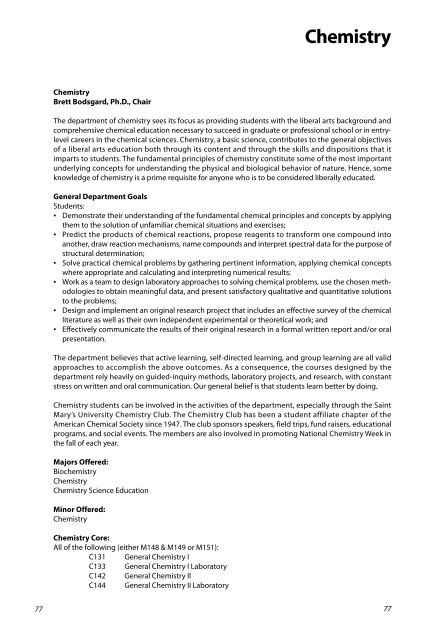PDF version - Saint Mary's University of Minnesota
PDF version - Saint Mary's University of Minnesota
PDF version - Saint Mary's University of Minnesota
You also want an ePaper? Increase the reach of your titles
YUMPU automatically turns print PDFs into web optimized ePapers that Google loves.
Chemistry<br />
Chemistry<br />
Brett Bodsgard, Ph.D., Chair<br />
The department <strong>of</strong> chemistry sees its focus as providing students with the liberal arts background and<br />
comprehensive chemical education necessary to succeed in graduate or pr<strong>of</strong>essional school or in entrylevel<br />
careers in the chemical sciences. Chemistry, a basic science, contributes to the general objectives<br />
<strong>of</strong> a liberal arts education both through its content and through the skills and dispositions that it<br />
imparts to students. The fundamental principles <strong>of</strong> chemistry constitute some <strong>of</strong> the most important<br />
underlying concepts for understanding the physical and biological behavior <strong>of</strong> nature. Hence, some<br />
knowledge <strong>of</strong> chemistry is a prime requisite for anyone who is to be considered liberally educated.<br />
General Department Goals<br />
Students:<br />
• Demonstrate their understanding <strong>of</strong> the fundamental chemical principles and concepts by applying<br />
them to the solution <strong>of</strong> unfamiliar chemical situations and exercises;<br />
• Predict the products <strong>of</strong> chemical reactions, propose reagents to transform one compound into<br />
another, draw reaction mechanisms, name compounds and interpret spectral data for the purpose <strong>of</strong><br />
structural determination;<br />
• Solve practical chemical problems by gathering pertinent information, applying chemical concepts<br />
where appropriate and calculating and interpreting numerical results;<br />
• Work as a team to design laboratory approaches to solving chemical problems, use the chosen methodologies<br />
to obtain meaningful data, and present satisfactory qualitative and quantitative solutions<br />
to the problems;<br />
• Design and implement an original research project that includes an effective survey <strong>of</strong> the chemical<br />
literature as well as their own independent experimental or theoretical work; and<br />
• Effectively communicate the results <strong>of</strong> their original research in a formal written report and/or oral<br />
presentation.<br />
The department believes that active learning, self-directed learning, and group learning are all valid<br />
approaches to accomplish the above outcomes. As a consequence, the courses designed by the<br />
department rely heavily on guided-inquiry methods, laboratory projects, and research, with constant<br />
stress on written and oral communication. Our general belief is that students learn better by doing.<br />
Chemistry students can be involved in the activities <strong>of</strong> the department, especially through the <strong>Saint</strong><br />
Mary’s <strong>University</strong> Chemistry Club. The Chemistry Club has been a student affiliate chapter <strong>of</strong> the<br />
American Chemical Society since 1947. The club sponsors speakers, field trips, fund raisers, educational<br />
programs, and social events. The members are also involved in promoting National Chemistry Week in<br />
the fall <strong>of</strong> each year.<br />
Majors Offered:<br />
Biochemistry<br />
Chemistry<br />
Chemistry Science Education<br />
Minor Offered:<br />
Chemistry<br />
Chemistry Core:<br />
All <strong>of</strong> the following (either M148 & M149 or M151):<br />
C131 General Chemistry I<br />
C133 General Chemistry I Laboratory<br />
C142 General Chemistry II<br />
C144 General Chemistry II Laboratory<br />
77<br />
77
















